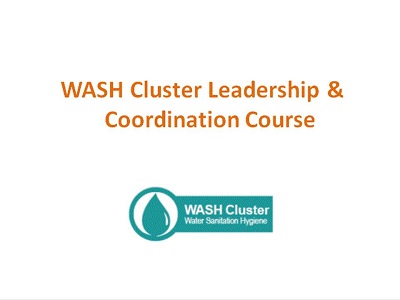GWC WASH coordination training pathway
This course is part of the GWC training pathway, created for both WASH Cluster partners and UNICEF staff involved in coordination to ensure the efficient WASH coordination in humanitarian action. This training pathway includes the following courses, most of them available in AGORA's catalogue:
- Partners' briefing on Humanitarian WASH coordination: Three succesive face to face briefing modules providing essential information on partner’s roles to actively participate in humanitarian WASH Coordination. For all WASH partners involved in humanitarian response
- Humanitarian WASH Coordination Induction: 2 days online training providing essential information and tools to coordinate WASH Cluster. For WASH partners or new UNICEF WASH staff fulfilling a WASH coordination role. Some sections are specific to IMO
- WASH Operational coordination (WOC): 5 days residential training providing operational tools and skills for WASH coordination. For Humanitarian WASH cluster / sector coordinators
- WASH Leadership & coordination (L&C). 5 days residential training to strengthen the skills for leading humanitarian WASH coordination platform. For Humanitarian WASH cluster / sector coordinators
- Government Led coordination of WASH in Emergency (GoLWIE, not yet on Agora). Several days workshop aiming at strengthening the role of national and regional government in leading and coordinating the humanitarian WASH response. Under pilot phase. Contact GWC if you are interested to pilot a GoLWIE in your country
- Market-based programming for WASH in Emergency (MBPWIE): 5 days residential training to strengthen the skills of WASH practitioners on Market and Cash related tools used for WASH programming
- GWC Information Management Training: 5 days residential training to provide Information Management Officers with advanced skills to support information management for WASH coordination platforms during emergencies
- Coordinated assessment process: Planned for 2020
- GWC training of trainers: ToT are specifically designed to train high level UNICEF staff and partners to deliver GWC training in autonomy
Course Background
Leading effective coordination requires strong inter-personal and communication skills as well as the technical knowledge of humanitarian systems and coordination functions. This training was designed using the results of a sector-wide learning needs analysis and was based on the UNICEF competency framework for coordination. It explores the skills (also called competencies) to lead coordination platforms using relevant examples from the humanitarian WASH sector.
Course goal
The aim of the course is to strengthen the skills for leading humanitarian WASH coordination platforms to better serve affected populations in a humanitarian response. As a result of the training, participants should have greater self-awareness, feel more confident, and be willing to apply the skills in their coordination platform roles. The training will also provide an opportunity to share experiences and best practises in WASH coordination between different actors in the sector.
Learning objectives
By the end of this course, participants will be able to do the following:
- Discuss how leadership and communication skills are essential to fulfil the six core functions of a cluster at the country level plus accountability to affected populations.
- Practise the skills and attitudes to build and maintain effective relationships with coordination partners, including disseminating relevant information.
- Practise effective communication skills, including active listening, negotiating, and public speaking.
- Practise effective coordination of teams, including meeting management, building consensus, and promoting a climate of teamwork and harmony.
- Demonstrate a personal commitment to achieving team results, including leading and influencing others and making decisions.
- Reflect on their personal competencies for humanitarian WASH coordination to identify their strengths and areas to develop their capacity.
Audience
This course is aimed at participants who are currently in a coordination role or participating in the humanitarian WASH coordination platform, and have already acquired general knowledge and skills on WASH Cluster coordination.
Length
5 full days (for example, starting at 9:00 on day 1 and finishing at 16:00 on day 5.
Methodology
The training is structured around the UNICEF competency framework for coordination, and focuses on four key competency domains, specific to effectively leading coordination: (1) maintaining a service oriented approach, (2) personal commitment to achieving team results, (3) communicating effectively, and (4) effective coordination of teams. Real life WASH sector examples are used. It also introduces how the competencies connect to the Humanitarian Programme Cycle. The course is grounded in active learning and gives the participants lots of opportunity to practice new skills to build their confidence and ability.
